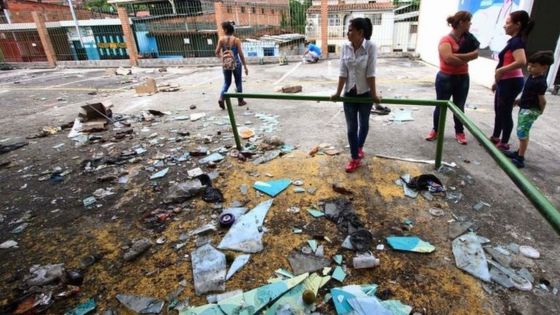
Venezuela says it is sending 2,600 troops to the western region of Tachira to quell looting and rioting amid continuing anti-government protests.
In the state capital, San Cristobal, most shops and businesses are closed and guarded by soldiers.
Three people, including two teenagers, were killed in Tachira this week.
Since the rallies for early elections and an end to the economic crisis began in early April, 43 people have died across the country.
President Nicolas Maduro has accused the opposition of inciting violence by calling people on to the streets.
Speaking on state television on Wednesday, Defence Minister Vladimir Padrino Lopez said: "I have ordered the transfer of 2,000 guards and 600 special operations troops."
The minister said the deployment in Tachira was part of "Plan Zamora" designed to pacify the situation. He provided no further details.
Meanwhile, looting continued in parts of San Cristobal, reports say.
People made off with items including coffee, nappies and cooking oil, local residents were quoted as saying by Reuters news agency.
A 15-year-old boy died in hospital, a day after he was shot during the spate of looting in San Cristobal. He was named as Jose Francisco Guerrero.
"My mom sent my brother yesterday [Tuesday] to buy flour for dinner and a little while later we received a call saying he`d been injured by a bullet," his sister Maria Contreras told Reuters.
The authorities earlier announced the deaths of Luis Alviarez, 17, and Diego Hérnandez, 33, who were fatally injured on Monday.
`Plan Zamora`: analysis by Candace Piette, BBC Latin America analyst
Defence minister Vladimir Padrino Lopez said the military operation in Tachira was part two of Plan Zamora.
The government has said little about what the plan entails - but that it is designed to pacify the situation.
When part one was put into action in the Carabobo state it involved an increased presence of heavily armed troops and riot police brought in to quell a spate of violent looting.
According to civil rights groups it also led to large-scale arrests of anti-government protesters and the use of military courts to try them.
Mr Padrino Lopez tried to reassure Venezuelans, saying the armed forces would not use weapons against civilians and would not be carrying pistols and machine guns.
He also seemed to pin responsibility for the deaths during recent protests across Venezuela on the government`s opponents, saying the fatal injuries had been caused by home-made weapons.
On Tuesday, President Maduro extended the nationwide state of economic emergency.
The decree gives Mr Maduro extra powers for another 60 days, from Saturday, including an ability to impose tougher security measures.
The opposition denounced the move as an ongoing rights grab.
Opposition leader Henrique Capriles responded by urging his supporters to take to the streets and protest "more than ever".
The unrest was triggered by a Supreme Court attempt to take over powers from the assembly on 29 March.
It reversed its decision a few days later but by then the opposition had seized the momentum.
Despite having the world`s largest known oil reserves, Venezuela is facing a shortage of many basic items, including food and medicines.
Its economy has collapsed, with inflation expected to top 700% this year, and crime is rampant.
The opposition is calling for early elections and the release of opposition politicians jailed in recent years, saying the socialist governments of Mr Maduro and his predecessor, the late Hugo Chavez, have mismanaged the economy since coming to power in 1999.
Mr Maduro accuses the country`s business elite of boycotting the economy to create unrest and topple his democratically elected government. His term ends in January 2019.


0 comments:
Post a Comment